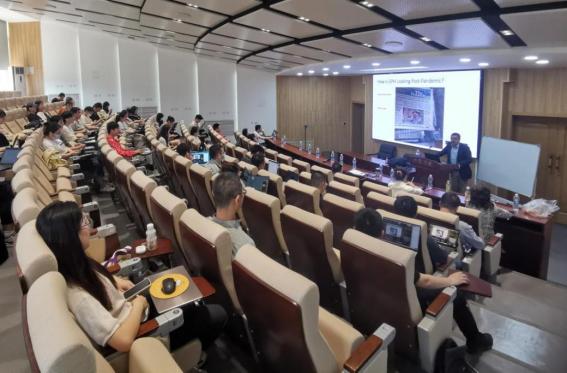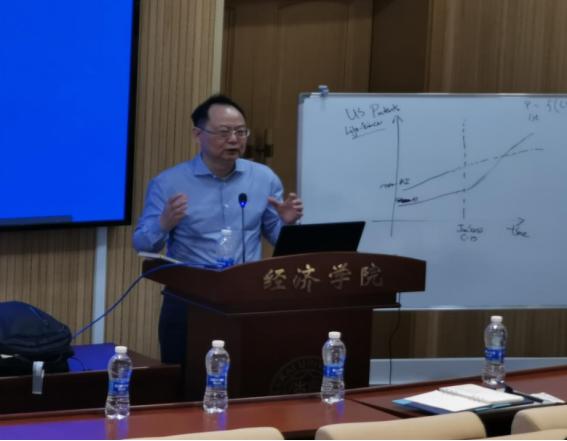Nankai Institute of Economics’ Biweekly Academic Seminar : AI and Global Public Health
2023-05-22
On the morning of May 16, the Nankai Institute of Economics held a biweekly academic seminar at Room 202 (a terrace classroom) of the School of Economics, Nankai University. The theme of this discussion was Artificial Intelligence and Global Public Health, and it was presented by Professor Chirantan Chatterjee. The session was chaired by Associate Professor Ding Jihong, with Professor Liu Gang serving as the commentator. The event saw a total of 150 faculty and students participating both online and offline.
Professor Chirantan Chatterjee is a Reader in Economics of Innovation at Science Policy Research Unit (SPRU), U-Sussex Business School. He is also the PhD Program Convenor & Co-Director in Policy Training & Executive Education at SPRU, U-Sussex. The SPRU was established in 1966 and has gained worldwide recognition for its extensive influence in the field of science and technology policy research. It is ranked first globally in the field of science and technology policy and development research, and first in the UK and third globally in the Think Tanks in Science and Technology category. The SPRU is the headquarters of the global New Schumpeterian School and has produced a number of renowned scholars in the field of innovation economics, including Freeman, Perez, and Pavitt.

On the morning of May 16, Professor Chirantan Chatterjee shared two parts of his presentation. The first part focused on AI and Public Health, while the second part discussed How Technological Substitution Facilitates Paradigm Shifts.
In the first part of his presentation, Professor Chirantan Chatterjee provided a detailed analysis of the relationship between AI and public health. He emphasized that the post-pandemic era presents a crucial opportunity to focus on public health and that it is necessary to highlight the importance of both private healthcare and public healthcare sectors. In addition, Professor Chirantan Chatterjee shared his viewpoints and solutions regarding specific issues, including the adjustment of the pharmaceutical supply chain, the significance of digital health, the application of AI in preventive medicine, digital payment for healthcare expenses, the importance of integrating public health into the digital ecosystem, and the use of AI in drug innovation, diagnosis, and competition. In summary, AI will have a profound impact on various aspects of public health, particularly in critical areas involving trust between patients and healthcare providers. It plays a positive role in improving global public health.
Following that, Professor Chirantan Chatterjee proceeded with the second part of his presentation, i.e. How Technological Substitution Facilitates Paradigm Shifts. He explored how a new medical technology can benefit non-paying patients in a non-profit setting by replacing outdated technologies.
As the presentation neared its conclusion, Professor Chirantan Chatterjee emphasized the relationship between demand-driven and technology-driven factors, highlighting the new opportunities brought about by technological advancements and the crucial impact of paradigm shifts. In the post-pandemic era, the frequency of technology usage has significantly increased, particularly in the healthcare sector. Therefore, there is an urgent need to gain a deeper understanding of technology adoption and its mechanisms in the healthcare field. By studying doctor-patient matching models and real-life cases, we can gain valuable insights into the impact of technological substitution on paradigm shifts.

During the interactive discussion session, the participating faculty and students actively engaged in lively discussions with Professor Chirantan Chatterjee on various topics such as the applications of AI, human-machine interaction with ChatGPT, and Sino-Indian cooperation. Later, Professor Liu Gang delivered an insightful commentary. Firstly, he expressed sincere gratitude for the academic contributions of the SPRU in the field of innovation economics, which have provided guidance and reference for China's innovation and economic development. Secondly, he highly praised Professor Chirantan Chatterjee's pioneering exploration in the field of smart healthcare, emphasizing the mission and responsibility of AI technology in achieving intelligent healthcare and home-based elderly care. Thirdly, he emphasized the significance and value of introducing AI-based healthcare solutions for addressing social issues in populous countries like China. Lastly, Professor Liu believed that there is tremendous potential for cooperation between China and India in the fields of technology, education, and economy. He highlighted the importance of fostering collaboration through joint efforts in nurturing excellent students, which would serve as a bridge for long-term cooperation between the two countries in the fields of technology and economy.
